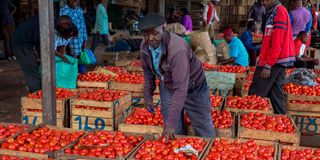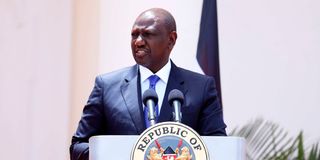Premium
Here’s how to survive hard economic times

Parents and guardians shop for textbooks and other school items for their children at Savanis bookshop on Latema Road, Nairobi County on January 23, 2023.
With the rising living costs, financial experts and fellow customers are offering tips on how to survive the hard economic times by cutting wasteful spending and making some savings.
As the prices of essential commodities rise, these suggestions are handy to help one live within their means and avoid incurring expenditures that would force them to borrow unnecessarily.
For Ms Jackline Karobia, a parent to a Form One student, shopping for textbooks at a street vendor along Kenyatta Avenue in Nakuru has saved her some cash.
“I have decided to buy some of the books from the street vendors because after comparing the prices in the established bookshops, the saving per book is Sh100 and with about five compulsory books in the admission letter, it means I will save Sh500,” she said yesterday.
Dr XN Iraki, an economics expert and associate professor at the University of Nairobi, says if you are rich and affluent, you don’t feel the pinch of the high cost of living but those that are hustling with no savings and no job are feeling the heat.
For those bearing the brunt of hard economic times, Dr Iraki suggests that one way to survive is by changing one’s consumption patterns by reducing the quantity and quality of purchases. This, for instance, includes shifting from designer brands to second-hand wear and resource sharing such as carpooling.
He also recommends that you wait until prices start going down to make some purchases and consider downgrading your lifestyle like avoiding using your private car and instead taking matatus.
Another way to cut costs, he suggests, is shifting to a smaller house or even changing the neighbourhood altogether if you have trouble keeping up with the rent.
“Women adjust quickly, men seem not to as they wonder what people will say about their change in lifestyle,” Dr Iraki says.
Liquid assets
A financial expert in a sensitive government agency, who requested not to be named, said Kenyans should seek to invest in liquid assets due to inflation and plan for every expenditure.
“This is a period when disposable income is declining due to increased taxation, for example on mobile money transfer, stagnant wages amid elevated inflation and increased cost of basic commodities. My advice to the vulnerable population would be to prioritise meeting needs and postponing long-term and illiquid investments and luxuries. Instead, they should invest in liquid assets and minimise wastages through bulk buying of durable foodstuffs,” she explains.
“During these tough times, you must improve your negotiation skills because things are very tough and the ability to negotiate with your partners, suppliers or people who provide services will be quite key. Through this skill, you will get breathing room. The second tip is being resourceful; ask yourself some of the things that you spent a bit of money on, can you find them at a cheaper price?” says Ken Gichinga, the chief economist, Mentoria Economics.

George Mutiso 60, tomato trader at Muthurwa Market in Nairobi County. With the rising living costs, financial experts and fellow customers are offering tips on how to survive the hard economic times by cutting wasteful spending and making some savings.
A banker suggests: “Your main source of income should guide your spending habits. If it’s affected by the ongoing economic challenges, then start by reviewing your budget and focusing on the priorities.”
For Vincent Masau, a businessman who sells shirts and sweaters at Koja in Nairobi, he has been forced to scale back on shopping in supermarkets and opt for the kadogo economy retailers.
“The business has not been going well. I used to go to the market three times a week, but now I only go once. This is because I now take longer to clear my stock, which I believe is because my customers are also pressed for money. For personal needs, I have stopped going to the supermarket. I get my cooking oil from mama pima and buy other items on a need basis, “ says Mr Masau.
Zipporah Atieno, a shopkeeper on Moi Avenue, has abandoned impulse purchases and is doing some chores herself to cut domestic expenditure.
“The high cost of living has forced me to buy only what I need and not necessarily what I want. That means I have to make a budget and strictly adhere to it. I also stopped impulse buying. I cannot buy nice things for myself and my children unless they are necessary. On my off day, I wash laundry for people to earn an extra income because my salary is not enough,” says Ms Atieno.
Stanley Mudimba, a third-year student at the University of Nairobi, says students are feeling the heat as parents reduce pocket money.
"Kuinama"
“Our parents can no longer afford to send money regularly. Now, my friends and I often skip meals. We call it kuinama, it's very common among university students. When a parent sends money and the rest don’t have, we sometimes survive on that as we wait for whoever will be next. We are a group of three friends, so it is manageable. Initially, we would get temporary jobs as brand ambassadors that paid us about Sh1,000 daily. We would promote products in supermarkets, but it's been a while since we landed any,” says Mr Mudimba.
Mr Richard Kirui, a teacher, regrets that his wife’s business isn’t doing well.
“I have even resorted to loans to take my children to school. It hurts so deeply that I teach people’s children while I struggle to get mine an education. We have also cut on expenses and asked my parents’ upcountry to supplement our food when they make harvests,” says Mr Kirui.
Leader of Majority in the National Assembly Kimani Ichung’wah says the solution to the high cost of living is exactly what the Kenya Kwanza administration is doing at the moment.

President William Ruto. Food shortages, a weak shilling and high commodity prices globally are among the factors that have contributed to a sharp increase in the cost of goods and services during President Ruto’s first five months in office.
“Curbing the high cost of borrowing by making credit cheaper and reducing the high cost of production has a greater impact on ensuring inflation is at lower levels,” says the accountant.
Tips on how to get by during the hard times
- To avoid impulse buying; create a shopping calendar.
- Prepare a shopping list and stick to it to only spend on essentials.
- Take advantage of bargains and shop in bulk to take advantage of wholesale pricing.
- Change consumption patterns/lifestyles like discarding designer labels for mitumba.
- Do some chores yourself like laundry during off days to reduce domestic costs.
- Do not overstock your business, avoid deadstock
- For students, take up short-term jobs like promotional jobs.
- Pool resources like hiring a taxi as a group.
- Compare prices from different outlets.
- Take measures to cut down on power bill like switching off lights
- Negotiate harder to get a better deal.
More pain awaits as higher taxes kick in
Food shortages, a weak shilling and high commodity prices globally are among the factors that have contributed to a sharp increase in the cost of goods and services during President William Ruto’s first five months in office.
But a revenue collection shortfall and new spending items mean that times are set to get tougher for Kenyans as the Kenya Kwanza government introduces new taxes to raise money to fund its priority programmes amid high inflation.
The President faces a fiscal deficit of Sh695.2 billion in his first budget, which, while a sharp drop from this year’s projected deficit of Sh849.2 billion this year, will force the government to borrow, exerting more pressure on public debt.
Dr Ruto is implementing Uhuru Kenyatta’s last Sh3.39 trillion budget for the financial year 2022/23 and, while he has tweaked spending to reflect the priorities of his administration, he has overseen the introduction of new taxes that have exerted an extra burden on taxpayers.
Besides the taxes, Kenyans are also having to contend with higher costs of fuel, electricity and maize flour as Dr Ruto trims spending on "consumption subsidies" in favour of "production subsidies" such as on fertiliser.
The Kenya Revenue Authority (KRA) has its work cut out for it, having had a shortfall of Sh19.1 billion in revenue collection in the first five months of the current fiscal year, amid intense pressure to increase the collection of revenue as the new tax measures kick in.
The government expects to collect Sh2.035 trillion in revenue by June. In a bid to increase income tax collection from banks and telcos, the government this month reinstated charges on money transfers between bank accounts and mobile money wallets.
Dr Ruto has also lined up new taxes with his eyes now firmly set on delivering his first budget that will hit Sh3.64 trillion for 2023/2024. The new budget comes amid additional tax measures that are aimed at squeezing more revenues from existing taxpayers but also netting more individuals and firms into the tax bracket.
To lay the ground for the new budget, Treasury has proposed a sharp increase in excise duty charged on select products that will take effect on March 1 if approved.
Through the Excise Duty (Excisable Goods Management System) (Amendment) Regulations, 2023, Treasury has proposed an increase of excise stamp duty for beauty products and cosmetics to Sh2.5 from Sh0.6, cigarette and alcohol users would pay Sh5 from Sh2.8 and stamp duty on fruit juices would cost Sh2.2 from Sh0.6.
In the new proposals, KRA also listed fruit and vegetable juices among goods the government is looking to raise more revenues from, raising the excise stamp fee by 266.7 per cent to Sh2.2 per stamp.
In Dr Ruto’s first budget, the Treasury expects to collect Sh2.89 trillion in revenues, a 15.1 per cent increase from the estimated Sh2.51 trillion estimated to be collected in the current financial year.
“As part of the economic turnaround plan, the government will scale up revenue collection efforts by the KRA to Sh3 trillion in 2023/2024 and Sh4 trillion over the medium term,” said the Treasury.
A new intervention planned by the government to aid this collection is the integration of the systems of telecommunications companies with those of KRA in a bid to monitor mobile transactions for tax payments.
“KRA will implement the integration of KRA tax system with the telecommunication companies (telcos),” it said.
The Kenya Kwanza government is also targeting to raise revenue collection from landlords who are not paying income tax on their properties. Treasury says it will map out all rental properties to seal rental income revenue leakages.
Additional reporting by Brian Ambani





